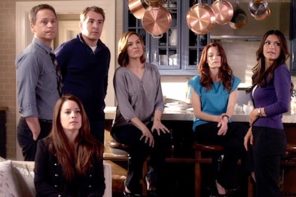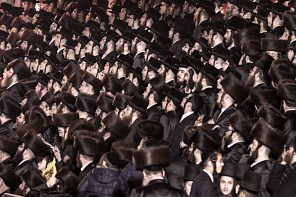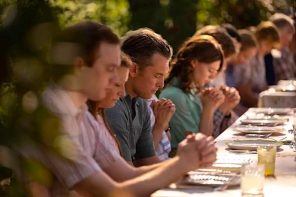Sacred underwear, baptizing holocaust victims, gods of their own planets.
When some of America’s most celebrated pundits and public intellectuals talk about Mormons, these are the images that are summoned. Ironically in this “Mormon Moment”—signaled by a hit Broadway musical, polygamous housewives on TLC, and of course two Mormon presidential candidates—Mormons, long considered quintessential “outsiders” to mainstream American culture, today find themselves at the center of the American zeitgeist. Yet it is the Mormons’ supposed theological weirdness that is the centripetal attraction.
As Joanna Brooks has noted in these pages, the New York Times recently featured Harold Bloom’s musings on how a President Romney would govern a country, and a planet, from which he would in the afterlife depart, becoming the god of his celestial body. More planet talk happened just last week on the Chronicle of Higher Education’s “Brainstorm Blog.” Michael Ruse, philosopher of biology, asserted that it is legitimate not to vote for a presidential candidate whose theology is “totally barmy. We can become gods with our own planets!… No coffee and tea is bad enough. But the underwear!” In October, in a column called “Anne Frank, a Mormon?” Maureen Dowd offered (via Bill Maher and Christopher Hitchens) the full rundown of Mormon “weirdness,” from Joseph Smith’s uneasy reputation to the “Jewish dust-up”: the posthumous baptism of Jews.
Casual assertions of knowledge about Mormon theology have dismayed longtime scholars of Mormonism. UNC’s Laurie Maffly-Kipp recently told me that “while seeming to archly critique the evangelical and atheist attacks on Mormonism,” Dowd’s column in particular represented “one pithy stroke of ignorance masquerading as informed opinion.”
A Desert of Belief
Critics like Dowd, Bloom, and Ruse would not reduce Catholicism to Popery, Hinduism to the worship of cows, or Islam to the promise of seventy virgins for jihadi martyrs. Why is Mormonism different?
There are two answers to this question.
The first is religious. It is the Mormons’ belief system, a system at odds with a ‘secular age’ when actual, as opposed to metaphorical, belief is no longer accepted as reasonable. At a talk last winter at the Harvard Law School, the don of Mormon letters, Richard Bushman, asserted that most Americans live in “a desert of belief.” The demands of secular rationalism have deforested the transcendent and supernatural even in the spiritual worlds of most religious Americans. Mormons on the other hand occupy “a jungle of belief.”
The audacity of the truth claims that Mormonism makes (angels delivering golden plates to a boy in early 19th-century upstate New York, modern-day prophets and everyday saints receiving revelations from Heavenly Father) requires that Mormon believers occupy a rich and imaginatively demanding spiritual world.
But even in this “jungle of belief,” Mormons don’t think on a daily basis about the theology behind their sacred underwear. They don’t pine for their own planets. Such obsession with what Mormons believe, even among America’s literati, belies the fact that Mormonism is foremost a belief system in action. Perhaps a concise summary of Mormon practical divinity comes from the late Church President, Spencer W. Kimball: “As God’s offspring, we have His attributes in us. We are gods in embryo, and thus have an unlimited potential for progress and attainment.” Still, at least according to the dictates of the Church of Jesus Christ of Latter-day Saints’ (LDS) current leadership, tapping into this unlimited potential takes a fairly workaday form: participating in time-consuming church service, forming heterosexual couples with the purpose of raising faithful Mormon children, and succeeding in the corporate world.
The second reason for the ongoing discussion of Mormons’ “weird” beliefs is political. Mormons are the last (or at least the latest) religious “other” to confront the heart of American politics, to deem themselves American enough to ascend to the presidency. Mormon scholar Newell Bringhurst told me recently that that the current public debates over Mormonism reminds him very much of the debate over Kennedy’s Catholicism in 1960. “Would Kennedy take orders from the Vatican?” many leaders from the American mainline churches anxiously asked. “No!”, assured Kennedy in his famous speech to a gathering of leading Protestant ministers in Dallas two months before the election. “I am not the Catholic candidate for president. I am the Democratic Party’s candidate for president, who happens also to be a Catholic. I do not speak for my church on public matters, and the church does not speak for me.”
Sticks and Stones
Romney has tried to answer skeptics of his church, but without Kennedy’s success. Mormons are still on the outs with key segments of the electorate he will need to win both the nomination and the general election. But as Bringhurst’s new book, The Mormon Quest for the Presidency points out, Romney and Huntsman are not the first Mormons to run for president, and thus not the first Mormons forced to defend the LDS Church as acceptably American. In fact the founder of Mormonism, Joseph Smith, launched a presidential bid in 1844: a campaign that ended when the Prophet was killed by an anti-Mormon mob.
Romney and Huntsman have not had to face down mobs. The violence against their Church has been rhetorical. But whether anti-Mormonism takes the form of villagers armed with muskets or the repeated chanting of “underwear, planets, tablets,” a glance at recent poll numbers about Mormon electability suggests that rhetoric does in fact hurt.
Following on Robert Jeffress’ diatribe at the Values Voters Summit, the recent Pew Forum survey found that the number one word Americans associate with Mormonism is “cult.”
The caricaturing of Mormon weirdness, even by public thinkers who should know better, does have consequences. Yet Mormon scholars like Bringhurst believe that this is a natural, and even welcome, vetting process of both Mormons as American and a Mormon as the chief American. (In this vetting process, one belief that America will soon discover—and a belief that the Mormon candidates could make more of—is that the LDS Church counts the Constitution as divinely inspired. Thus the Mormon canon of sacred scriptures includes the central document of America’s political and moral self-construction.) Many Mormon scholars believe that, as is the case today with Kennedy’s (and now Newt Gingrich’s) Catholicism, in fifty years the idea of a Mormon in the White House won’t raise many eyebrows at all.
Yet what about the short term?
One solution is to stop talking about religion as part of a presidential candidate’s resumé altogether. In an op-ed on the Rachel Maddow Show, political scientist Melissa Harris-Perry insinuated this solution. She argued that there are many reasons for Republican primary voters not to vote for Mitt Romney—many secular reasons. But his Mormonism is not one of them. Harris-Perry wants to draw a clear line between evaluating a candidate and analyzing a candidate’s faith.
In a lecture at the Danforth Center this fall, E.J. Dionne proposed a different solution: limit discussions of candidate’s faith to how this faith might influence his or her political perspective and policies. This would not include sacred underwear, seventy virgins, or transubstantiation. It does however include (as Michael Ruse allowed in his CHE post) discussions of how a candidate’s theological views of the Holy Lands, for example, might affect American policies regarding the Middle East.
As a scholar of Mormonism, and not (as I hope is obvious) as a spokesperson for the LDS Church, I must stay continuously alert to the unique context my work inhabits.
I recently wrote for The New Republic about the LDS Church’s complicated, and often troubling, history with questions of race. I’ve studied this issue for years, and for the story reached out to many different LDS constituencies for comment—including the Church itself. Yet by discussing the Church’s historical sins, I ran the risk of contributing to the othering of Mormons. Though my intention was to tell a different story about the LDS Church’s racialized history than Laurence O’Donnell’s rant on the subject in 2007, in this politically-charged environment it is hard to separate nuance from vilification.
As one Church spokesman told me on background, with two Mormons running for president, no matter how fair Mormon scholars try to be, any discussion of Mormon peculiarities can and will be used to make the Mormons seem weird, un-American, and unelectable.
I take this fair bit of caution to heart. Even criticizing caricatures of Mormon theology in the media reactivates these caricatures.
So yes, religion does intersect with politics in this country, and we do need to find ways to talk about it. I’d like to suggest, though, that unless a set of Mormon underwear declares its candidacy for the presidency we would do well to leave it out of the conversation.




